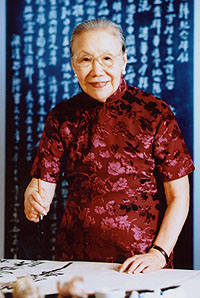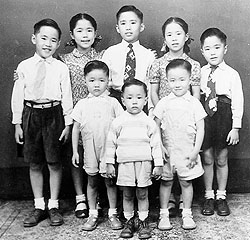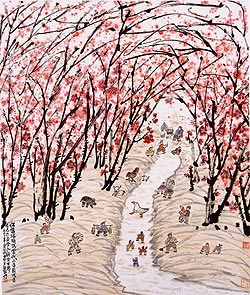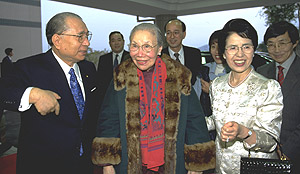Fang Zhaoling--Paintings of the Heart
[From an essay series by Daisaku Ikeda in which he reflects on his encounters with various world figures.]
I first met Chinese painter and calligrapher Fang Zhaoling in 1996, at a dinner for honorees of the University of Hong Kong. A woman of great learning and character, she was vibrant and energetic, shining like a jewel. It was only later that I learned that her inner life had been ground and polished to its present brilliance through profound suffering.

Fang Zhaoling
Born on January 17, 1914, she grew up enjoying the warmth and comforts of a loving, cultured family life.
Her father rented a house to the general of one of the warlords who effectively divided military control of China among them. One day, when Zhaoling was 11, her father was coming to meet his family by boat, the usual means of transport in the area. Suddenly, three soldiers who had been lying in wait aimed their guns and started shooting at the boat. The bullets pierced her father's luggage and entered his body. "Get down! Get down!" were his final words to Zhaoling and her sister.
In the wake of her husband's assassination, Zhaoling's mother sought to prepare her daughters for life in a turbulent world by providing them with the finest possible education. It was her conviction that this was the most certain thing she could offer them.
In 1931 the young Zhaoling went to England to study at the University of Manchester where she was the only female Chinese student. Her husband to be, Fang Yingao, was already studying at Manchester when she arrived. They married as students. Contrary to the prevailing mores of the times, Fang Yingao was broadminded and treated her as an equal. They discussed everything. Their first child, a son, was born. They were happy.
But in 1940, the hellish flames of Hitler's aggression were lapping the shores of England. The lights of safety and security were being extinguished. Seeking refuge, the couple traveled to Norway and then New York. Pregnant, she traveled three days and nights by train to arrive in Los Angeles en route to China. One week after the family's arrival in Shanghai, twin daughters were born. They made their way to Hong Kong, but here again they encountered war. The Japanese army invaded, perpetrating unspeakable atrocities against the local population. The young family, driven by the sound of marching boots and gunshots, traveled from place to place across the vastness of the Chinese mainland. The children born during these years each had a different birthplace.

Fang Zhaoling`s eight children
Each day Zhaoling felt as if she were taking her children by the hand to make another desperate passage over stretches of thinly frozen ice. It was her husband Yingao who gave her hope and reminded her of her special talent. Never forget your painting, he encouraged her, that is the path you must pursue. Just being near him, feeling his broad, embracing spirit, brought courage forth from within her.
In 1948, after almost 10 years of wandering and flight, the Fang family settled in Hong Kong. Then on September 9, 1950, just as the family was starting to savor the joys of peace and a return to normal life, Yingao died of illness.
Stunned, Zhaoling turned her gaze to the heavens. She pondered the cruel mystery of fate. At 36, she was alone with eight children to care for.
The oldest was 11, the youngest 3: six boys and two girls. Eight sets of eyes all shone with the same question, the same fear: "What are we to do? How are we to live from now on?" She held her children tight, trying in vain to hold back her own tears which fell in hot streams down her cheeks.
"You were always there . . . you were always kind. We shared everything. Why must death be the one thing we can't share . . . ?" Waking in the middle of the night, she found herself alone. Alone in a dark maze. In the midst of a stillness in which the stars themselves seemed to have stopped moving. Alone. She felt the burden of an enormous void, as deep as the oceans, as vast as the sky.
Again and again, she reminded herself that she must go on living. And yet . . . There is nothing more fragile than the human heart. At the same time, there is nothing more indestructible. She had reached the point that is known only by hearts that have been plunged into the very pit of grief, but have refused to die. It is there that we encounter a light that shines from the depths of life, from the compassionate essence of the universe. Only those who have known the biting cold of winter can truly appreciate the compassion and love of the sun.
Even the longest night will eventually give way to dawn. One day, she felt her husband's presence. She heard him speaking within her heart, offering the same warm encouragement he always did. "I am with you, here, now. I will be with you always," he seemed to say.
And it was then that Fang Zhaoling vowed never again to dwell on the past. If I move forward, she thought, he will advance alongside me, with me. We will be together.
Embracing the precious treasure of a bundle of her husband's letters, Fang Zhaoling began a new life. She started running the small trading company her husband had left her. She made efforts to ensure that, just as her mother had before her, she would give her own children the best education possible.
When she had achieved a degree of financial security, Fang Zhaoling set out once more on the path of learning. While intensively studying calligraphy and painting, she enrolled in the University of Hong Kong. She followed this with studies at Oxford University.

"Environmental Protection" by Fang Zhaoling
She sought out new frontiers in Chinese painting. She was determined to develop an entirely new and unique way of portraying human figures and landscapes. She once told me she felt it took her 50 years to develop her own style of painting.
Victory, whether in art or in life, is found in dedicated, uncompromising effort.
Buddhism teaches that the heart is like a skilled painter. Both art and our lives are faithful expressions of what is in our hearts. Everything, I believe, comes down to that.
Through all adversity, Fang Zhaoling's heart remained undefeated. She continued to advance, determined to make each day a step forward.
The experience of having endured and overcome such profound sadness has completely liberated her from fear. The sufferings of life have dug out a deeper, wider space for the world of her heart; and paintings of stunning beauty and power have grown in that inner expanse. In everything she sees she feels the light, the shapes and shadows, of life itself. Mountains, rivers, ceaselessly changing landscapes--all these appear as a vast song of life. With every passing year, a new cosmos comes into being within her.
Her children have all grown into fine, accomplished people. One is a simultaneous interpreter for the United Nations; another, a company president; one is a lawyer and two are doctors. One of her daughters, Anson Chan Fang On-Sang, played a crucial role in the return of Hong Kong to China and later became known as the conscience of Hong Kong.

Daisaku and Kaneko Ikeda with Fang Zhaoling (center) (Hong Kong, February 1997)
The day after we met, mother and daughter were both conferred with honorary doctorates from the University of Hong Kong.
Later, Fang Zhaoling sent me two family photographs. The first, taken one year after the passing of her husband, shows eight sweetly innocent children huddled together. The second, taken in 1995, shows eight men and women, dignified and confident, gathered smiling around their mother.
Into her 80s, Fang Zhaoling continued to rise early and paint for six to eight hours each day. Staying busy, she says, is the secret to long life. "If you are engaged and occupied with your work, you don't bother worrying about small problems. You don't dwell on things or let them bother you."
In January 1997, when she was already 83, she inscribed a calligraphy that seems to sum up her life:
Once more I rise to scale the high peak
[Courtesy, July 2005 SGI Quarterly]
Share this page
















